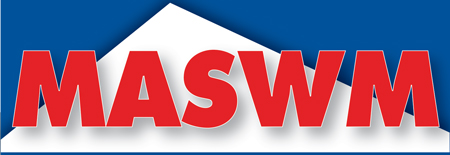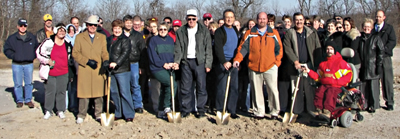
Members | About Workshops | Services for Missourians | News
Dignified and meaningful employment
for people with disabilities

Missouri’s nearly 90 Extended Employment Sheltered Workshops are actually independent, small businesses that employ nearly 6,000 people with disabilities. To make that work for more than 50 years, they have developed a range of services that now include everything from recycling wood products to operating greenhouses.
Missouri Workshops: Great Services and a Great Bargain
Missouri is home to nearly 90 workshops that employ people with developmental disabilities. And while almost everyone knows about the shops in their community, few see the entire picture of this remarkable network.
Workshops are actually small, independent businesses. Although they may receive funds from a county levy and support from the state of Missouri, 60 to 80 percent of their funding comes from business services they provide to the community.
Diverse Services
These contract services are everything from packaging to assembly for local or even national businesses. The services often include maintenance for area offices or public locations such as highway rest stops. Recycling for paper and other materials is another service many workshops provide. Several even manufacture their own products as creative ways to augment their income and provide employment for people with disabilities. Others operate craft shops, thrift stores and other retail outlets that help sell their goods and often provide retail and service training for people with disabilities.
This “Missouri Model” of services is in sharp contrast to programs that would have to be completely subsidized. Many of these workers might have few if any options other than programs operating entirely with government funding. With workshop employment, they receive invaluable job and life skill training, along with the satisfaction of earning a paycheck. And Missouri also benefits with an investment of only $1 for every $4 returned.
Working Hard to Succeed
There are several unique factors that make this possible. The “work” in workshop is no accident. Because they compete for the majority of their income, Missouri’s workshops focus intensely on their business customer needs, offering a maximum of flexibility and quality. In recent years, as overseas “outsourcing” has cut into workshop contracts, these organizations have leveraged creative insight and business savvy to develop new services and products that help maintain revenues to employ people with disabilities.
Workshop employees with disabilities are paid based on their ability to perform in relation to the performance of a person without a disability. If an employee produces 50 percent of what a non-disabled person produces, then he or she receives 50 percent of what that person is paid. These procedures are checked frequently by the U.S. Department of Labor.
This can add to the burden of workshop supervisory and administrative staffs. This group may include some of the hardest working employees in Missouri. Because of the special needs of workers with disabilities, supervisory staff often do “double duty” with additional responsibilities. A typical example involved a supervisor who was preparing bids for work with a major national corporation one minute, then assisting with the special medical needs of a worker with a disability the next minute.
Savvy Business
Workshops generally have their own sales staff that call on local businesses to make them aware of the services the workshop can provide. Other workshops have joined together in cooperative arrangements to share salespeople, while still others depend on the manager to do the sales work. Much of a workshop’s business is repeat business from satisfied customers.
Since each workshop is a private, not-for-profit corporation, each is overseen by a volunteer board of directors. Board members include local business people, educators, lawyers, accountants and family members of employees. The board outlines the general course for a given shop and hires an operational manager for the day-to-day operations.
Multiple Challenges
None of this is easy. Unlike traditionaql state agencies, Extended Employment Sheltered Workshops do not receive direct appropriations. Instead, they are funded on a per-day basis for each employee. The per diem applies to a six-hour workday.
Still another challenge comes from well-intentioned people who wish to employ all workers with disabilities in private business. Although many workshops do operate community employment departments in cooperation with outside, private businesses, workshop veterans and their family members realize that placing all workshop employees in private, competitive businesses is unrealistic. Some would even be at risk or prefer the more protected environment of a workshop. In fact, it was the need for this very "sheltered workshop" environment that led parents and other caring people to found Missouri workshops in the first place.
Regardless of these and other hurdles, workshops continue to provide employment for nearly 6,000 Missourians, important businesses services and invaluable contributions to their communities.
More About Workshops
A Real Bargain | Our Foundation | Consumers | Opportunities | Businesses | Busness Services
Grassroots History | What People Say | About Workshops | MASWM Mission Statement
MASWM The Missouri Association of Sheltered Workshop Managers
If you have questions, please contact:
President Tim Poepsel – (573) 503-0000 or tpoepsel@empacgroupinc.com
or Legislative Chair Kit Brewer – (314) 647-3300 or cbrewer@cuinc.org